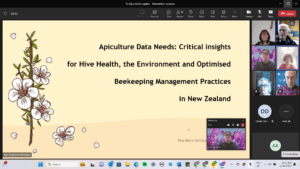
Tina Blumenthal, Lecturer at the School of Computing in Tairāwhiti, spoke on her presentation – Apiculture Data Needs: Critical insights for hive health, the environment and optimised beekeeping management practices.
The final Te Kai a te Rangatira Lunchtime Research Presentation of 2023 featured two EIT | Te Pūkenga researchers from Hawke’s Bay and Tairāwhiti.
Tina Blumenthal, Lecturer at the School of Computing in Tairāwhiti, spoke on her presentation – Apiculture Data Needs: Critical insights for hive health, the environment and optimised beekeeping management practices.
Tina said the primary objective of this research is to understand the significance of data that supports the wellbeing of beekeepers and honeybees, as well as their community of stakeholders, and how that data is applied currently.
“The apiculture sector is operating just on the fringe of technology developments, particularly with regards to data acquisition and data management. In today’s society, data has become an essential information resource of significant value to organisations across all industries.”
While EIT | Te Pukenga IDEAschool design lecturer James Smith explored research undertaken in 2023 on the integration of design-based research (DBR), design thinking, and enactive education, and also presented ideas for future collaboration.
James’ presentation explored the adaptation of the design curriculum post-cyclone Gabrielle, emphasising the enactive approach, viewing learning as meaningful lived experiences enacted by learners in their interactions with the environment.
“The dynamic interplay between these methodologies, showcases their potential synergy in fostering resilience, adaptability, and dexterity for both students and educators in diverse pedagogical contexts.
“Through an exploration of these interdisciplinary approaches, the research sheds light on how they can collectively contribute to a more responsive and resilient pedagogy in the face of environmental challenges and other complex socio-ecological problems.”
The presentation extended its focus to propose an enactive ecological view of design thinking and design-based research processes.
It explored how these frameworks can transcend the boundaries of design education and be applied to improve the rapid adaptation of diverse curriculum in light of uncertain contexts.
“By adopting an enactive ecological design thinking and/or DBR perspective, the research aims to demonstrate the broader utility of these methodologies in fostering heightened adaptability and resilience, not only for design students but for learners from all disciplines.”
For James, it marked his last time participating in the research presentation for EIT | Te Pūkenga, as he will move to Auckland next year to complete his PhD.
“I just wanted to extend the offer of collaboration or staying in touch going forward into the future and I would love to have the opportunity to join and listen into some of these sessions again going forward into next year.”

